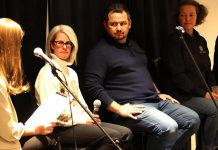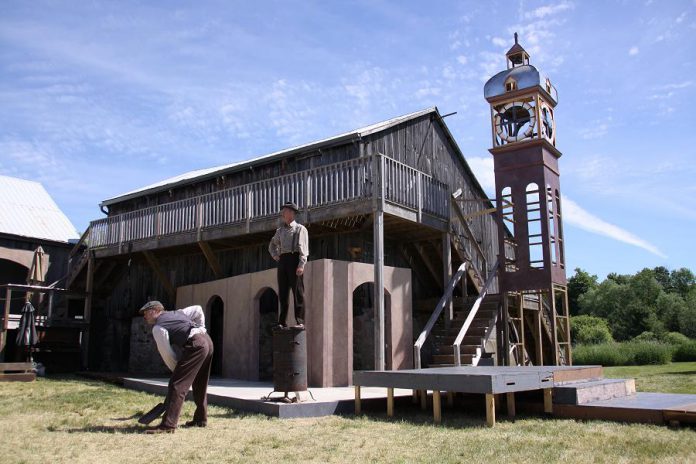
Earlier today, kawarthaNOW publisher Jeannine Taylor and writer Paul Rellinger attended 4th Line Theatre’s “Media Day” for the theatre company’s upcoming original production, The Hero of Hunter Street. Paul’s story about the production follows, with photos by Jeannine.
It’s just before 10 a.m. on Monday, December 11, 1916.
Peterborough children have started a new school week by singing one of “Rule Britannia”, “God Save The King” or “The Maple Leaf Forever”. In the downtown core, early shoppers are strolling alongside newly paved streets. And at General Electric, where some 2,000 toil, workers are hard at it, earning their average annual wage of $417.
And then it happened.
A spark crosses paths with oat dust in a Quaker Oats grain elevator, causing a massive explosion and resulting fire. Some 200 workers are evacuated but they leave behind 24 dead, another 180 injured and a then-unfathomable $2 million in damage. And there are so many shattered families — the cruel common denominator of all multi-victim disasters before and since.
Almost 100 years to the day since that disaster, 4th Line Theatre near Millbrook (779 Zion Line, 705-932-4448) is staging The Hero of Hunter Street as the opener of its two-play summer season and its milestone 25th anniversary go-round.
With a cast of more than 40 professional and volunteer actors portraying more than 90 characters, the term “epic” was heard more than once Wednesday (June 15) during a media event.
It was some four years ago that Robert Winslow and Kim Blackwell — 4th Line’s founder and managing artistic director respectfully — approached playwright Maja Ardal with the idea of penning a new play with the Quaker Oats fire and explosion at its centre. Maja jumped into the task full bore.
“I was terrified,” she recalls of her initial reaction.
“You can’t actually make a play out of a disaster. People don’t go to the theatre to see a disaster. You have to find out where the heart beats.”
Maja found that heart in the form of the story of Lorna Green, a Lindsay resident and 4th Line actor for the past four seasons who first pitched the idea for the play to Robert and Kim. Among those who didn’t return home from Quaker on that cold December day were her great grandfather, William Hogan, and her grandfather, Dennis O’Brien.
“My dad didn’t talk about it a lot when he was younger,” says Lorna.
“When I started looking at the story after he passed away, I realized how it had affected him. For me, it’s very emotional. My father was seven years old at the time it happened, so it really clouded his life. When he and siblings were together — they were all approaching their 80s — they would talk about it and cry.
“I attended the 90th anniversary (of the Quaker disaster) in 2006. It was at that time that I realized it wasn’t just my family that was affected. I thought this story needs to be told. I was sure other families were affected the same way mine was.”
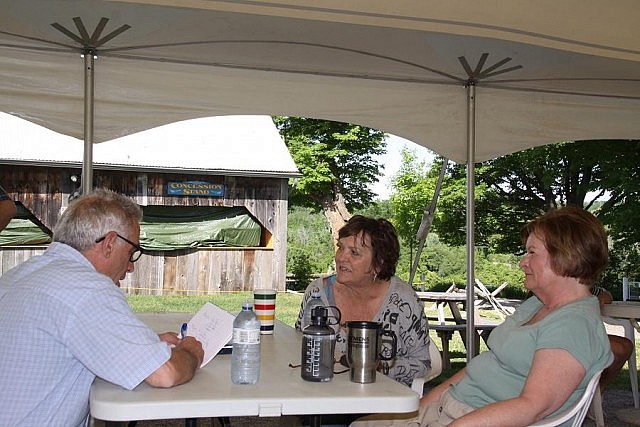
So it was that Lorna, enlisted by Maja, recounted her family history. The end result, says the playwright, is a play that focuses more on community than the actual disaster.
“What were the hopes and dreams of the community … how did the community tackle the disaster,” notes Maja.
“The disaster is the catalyst. The main thing became what did it feel like, it (the disaster) being a few days before Christmas? What did it feel like to be looking forward to the future and then this? What did it feel like for these people to now look at their lives in a new way?
“I kept going for long walks and thinking about what it was like in 1916. There was the First World War going on. There were people trying to keep body and soul together. And there was this big disaster. I thought, ‘I think this play must be about what a hero is.’ I’m going to try and figure out what it means to be a hero.
“We fantasize about what we think a hero is, like the kid who runs off to war, or we find ourselves doing remarkable things that we never thought we could do. There’s a wonderful revelation in this play but I’m not going to be a spoiler. It has to do with Lorna and what we discovered.”
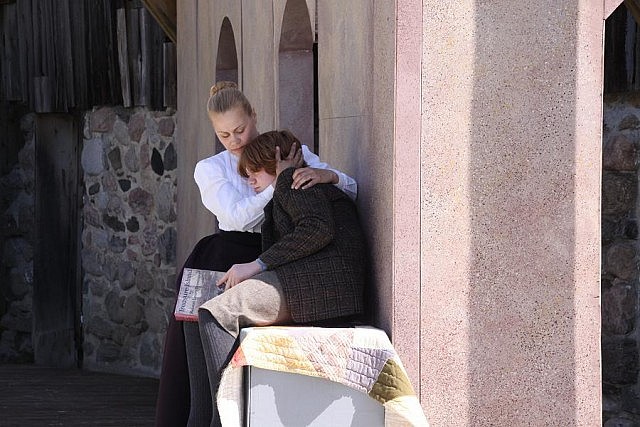
In the process of assisting Maja, Lorna came to a realization that was initially startling for someone so familiar with the disaster over many years.
“I discovered there are a lot of people in the area that aren’t aware of this disaster at even a basic level. This play does what 4th Line does so well. It teaches in a very entertaining manner.”
In making that observation, Lorna, in the simplest terms, captures what has been 4th Line Theatre’s mandate since it debuted in 1992 with The Cavan Blazers — tell captivating stories of local history long forgotten and, in many cases, had been shut away for years in the memories of those who were there and/or were affected by events of so long ago.
“I wasn’t aware of the generations of families that worked at Quaker and the generations that still feel the loss,” admits Kim, the play’s director.
“It (Maja’s script) is the best first draft I’ve ever read. She was able to capture the emotional piece with the O’Brien family, to be able to really capture what was going on in the factory, what was going on in Peterborough in 1916 and then what was going on internationally.
“The other thing that struck me is how, 100 years later, so many people are still invested in what happened because of the trickle down of families who just never forgot.”
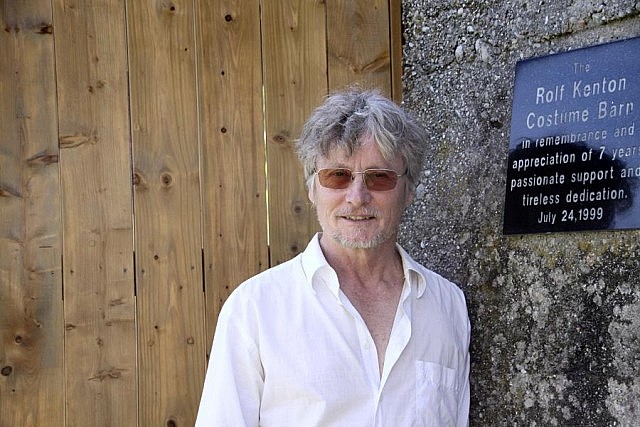
“It was something I wanted to do but I didn’t know it would still be interesting to people 25 years later,” he says.
“I think that tells you a lot about how we, as human beings, live our lives. We need to create, or listen to, or be exposed to stories about ourselves. That doesn’t seem to die out. There’s still a real appetite for storytelling.”
Robert notes that staging compelling theatre in an open air setting, the beautiful Cavan countryside as its backdrop, doesn’t hurt matters.
“But if the product was garbage, if what was on stage was laughingly bad, I’m not sure whether the environment by itself would be sufficient to have such dedicated audiences for so long. But many people, even urban people, trace their origins to the country. There’s a draw still to this kind of environment in our DNA.”
Professional actor Mac Fyfe, who portrays both Dennis O’Brien and Ajax The Strongman, is performing with 4th Line for the first time.
“I think it’s one of the best contracts in the province,” he praises.
“They treat you really well, the people are great. On your lunch break you can go down and jump into the creek and cool off. That’s pretty good.”
In portraying Dennis, one of the play’s central characters, he says he and Kim “had similar ideas about this guy since the beginning.”
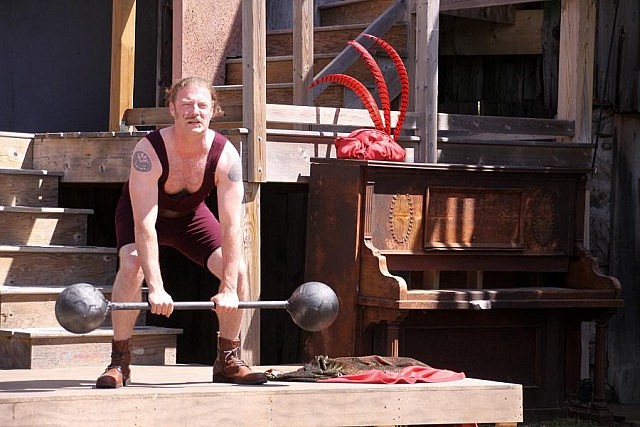
“Dennis is, at this point, trying to move ahead in the world and buy a house for his family through the bank, which is kind of a new thing for someone like him, someone of such a low class. I think the tragedy comes in when you see this guy, who’s full of life and a great family man, lose his life through something that shouldn’t have happened.”
For Kim, overseeing a cast comprised of both professional and community actors — the “bedrock” of 4th Line Theatre as she puts it — still provides genuine joy some 22 years and 14 directed productions later.
“What I’ve always enjoy watching are the professional actors who come in that are blown away by our community people … I know what they can do but I think, for them, it’s quite a revelation,” explains Kim.
As for 4th Line Theatre’s continued success — its summer season still consistently sells out — Kim says there are a number of factors in play.
“I think the farm experience is a big part of it,” she says.
“But I also think the epic nature of the work creates a kind of community theatre quality … the actors’ families come, their grannies, their moms and dads. I also think that we start very early in the process of developing a play, introducing the work to our audiences though the Breaking Ground and First Look programs, and they (audience members) really feel an ownership of the piece. They see their stories and themselves reflected on our stage.”
Maja, who first experienced 4th Line Theatre when she took in Schoolhouse in 2007, also remains captivated.
“4th Line is a becoming a stronger and stronger company in a climate where theatres are struggling,” she says.
“I’ve been coming back ever since. It’s just such an amazing experience. Not just going to a play but having a day-long experience. Having a picnic, being with all the people. I just find it really exciting to see how 4th Line is evolving with the times, bringing back some of the old shows but also developing exciting new works with different playwrights.”
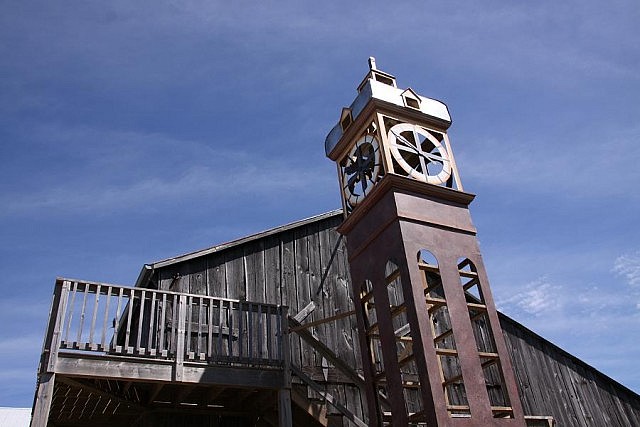
As opening night for The Hero of Hunter Street nears, she’s equal parts nervous and excited.
“I’m an actor too and, as an actor, I always think that it’s incredibly frightening and exciting because you really are, for the first time, going to get everybody’s complete reaction to what you’ve been doing for a month. As a playwright, you basically sit back in the shadows and say, ‘OK, once upon a time, this was mine but it’s not mine anymore.’ I gave it away but now I get the gift back from the actors.”
Meanwhile, for Lorna, who maintains relating her family’s story to Maja was “therapeutic”, the staging of this story is the long in coming. She admits to tearing up during readings and rehearsals.
“I have been waiting for The Hero of Hunter Street for 10 years,” says Lorna, who portrays Alice, a neighbor of the O’Brien family and a matron at St. Joseph’s Hospital, where there were just 35 beds for the far too many injured. Among those she has secured tickets for are her son, daughter-in-law and granddaughter, coming from Japan for performance.
As always, Kim’s work as director is basically done when the play debuts and its success is in performers’ hands. She will, however, keep a close eye, and ear, on the response.
“I love the relationship between art and audience … it’s about the give-and-take between the performers, and the audience taking that in and responding,” she says.
“When that mix is happening, when it’s working, that’s when I know we’ve nailed it.”
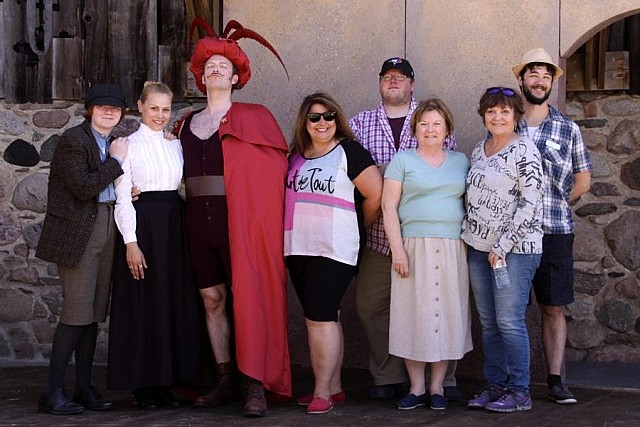
The Hero of Hunter Street opens on July 2nd and continues to July 23rd. Curtain is 6 p.m. Tuesday through Saturday, with an added Monday performance on July 18th.
Tickets can be purchased by phone at 705-932-4445, online at 4thlinetheatre.on.ca or in person at the box office, 4 Tupper St. in Millbrook or at the Peterborough Museum and Archives atop Armour Hill in Peterborough.
Meanwhile, 4th Line Theatre will present a look back on 25 years with a multi-venue art show. All works will be curated by Kim and will represent the history of the theatre at the Winslow Farm.
The original pieces will hang at Black Honey (221 Hunter St. W., Peterborough) from June 27th to July 24th to coincide with staging of The Hero of Hunter Street. The show opening will be held at Black Honey on July 6th from 1 to 2 p.m.
The show will then move to The Pastry Peddler (17 King St. E. in Millbrook) where it will be on display from August 2nd to 28th to coincide with 4th Line’s next production this summer, the return of The Bad Luck Bank Robbers.
One hundred per cent of sales of the art will go to the contributing artists.


